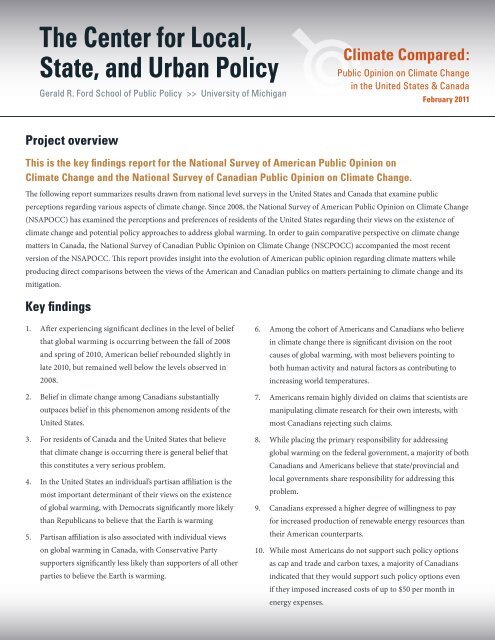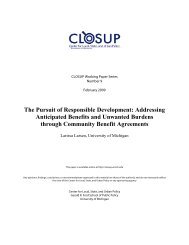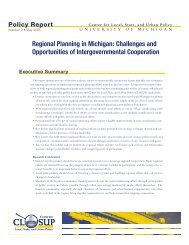Public Opinion on Climate Change in the United States & Canada
Public Opinion on Climate Change in the United States & Canada
Public Opinion on Climate Change in the United States & Canada
You also want an ePaper? Increase the reach of your titles
YUMPU automatically turns print PDFs into web optimized ePapers that Google loves.
<strong>Climate</strong> Compared: <str<strong>on</strong>g>Public</str<strong>on</strong>g> <str<strong>on</strong>g>Op<strong>in</strong>i<strong>on</strong></str<strong>on</strong>g> <strong>on</strong> <strong>Climate</strong> <strong>Change</strong> <strong>in</strong> <strong>the</strong> <strong>United</strong> <strong>States</strong> & <strong>Canada</strong>Belief <strong>in</strong> climate changeFor much of <strong>the</strong> last decade public op<strong>in</strong>i<strong>on</strong> polls have shown that Americans have <strong>in</strong>creas<strong>in</strong>gly acknowledged <strong>the</strong> existence of climatechange. This growth <strong>in</strong> belief was particularly pr<strong>on</strong>ounced between 2007 and 2008 when numerous polls c<strong>on</strong>verged <strong>in</strong> show<strong>in</strong>g thatAmericans were more likely than ever before to express belief <strong>in</strong> global warm<strong>in</strong>g. But this trend shifted markedly <strong>in</strong> more recentyears. Numerous surveys, <strong>in</strong>clud<strong>in</strong>g those of <strong>the</strong> NSAPOCC, have shown a decl<strong>in</strong><strong>in</strong>g percentage of Americans express<strong>in</strong>g beliefthat temperatures <strong>on</strong> Earth have been <strong>in</strong>creas<strong>in</strong>g (see Table 1). In this study we f<strong>in</strong>d a slight rebound <strong>in</strong> levels of belief am<strong>on</strong>g U.S.residents with belief levels <strong>in</strong>creas<strong>in</strong>g from 52% to 58% between March and December 2010.Table 1Views of Americans <strong>on</strong> <strong>the</strong> existence of global warm<strong>in</strong>g 2008 -2010There is solid evidenceof global warm<strong>in</strong>gThere is not solid evidenceof global warm<strong>in</strong>gNot sureFall 2008 72% 17% 11%Fall 2009 65% 20% 15%Spr<strong>in</strong>g 2010 52% 36% 13%Fall 2010 58% 26% 16%Questi<strong>on</strong> word<strong>in</strong>g: From what you’ve read and heard, is <strong>the</strong>re solid evidence that <strong>the</strong> average temperature <strong>on</strong> Earth has been gett<strong>in</strong>g warmer over <strong>the</strong> past four decades?<strong>Canada</strong>, <strong>in</strong> c<strong>on</strong>trast, presents a very different case, with 2010 survey f<strong>in</strong>d<strong>in</strong>gs <strong>in</strong>dicat<strong>in</strong>g greater belief <strong>in</strong> <strong>the</strong> existence of globalwarm<strong>in</strong>g than has ever emerged <strong>in</strong> <strong>the</strong> NSAPOCC surveys <strong>in</strong> <strong>the</strong> <strong>United</strong> <strong>States</strong>. More specifically, 4 out of 5 Canadians currentlybelieve that <strong>the</strong> Earth is warm<strong>in</strong>g compared with about 3 <strong>in</strong> 5 Americans (see Table 2). In additi<strong>on</strong>, Americans were almost twice aslikely as Canadians to <strong>in</strong>dicate a belief that climate change was not occurr<strong>in</strong>g, with 26% of U.S. residents stat<strong>in</strong>g that <strong>the</strong>y perceive nosolid evidence of global warm<strong>in</strong>g, compared with <strong>on</strong>ly 14% of Canadians who resp<strong>on</strong>ded <strong>the</strong> same way.Table 2Views of Americans and Canadians <strong>on</strong> <strong>the</strong> existence of global warm<strong>in</strong>gThere is solid evidenceof global warm<strong>in</strong>gThere is not solid evidenceof global warm<strong>in</strong>gNot sureAmericans 58% 26% 16%Canadians 80% 14% 6%Questi<strong>on</strong> word<strong>in</strong>g: From what you’ve read and heard, is <strong>the</strong>re solid evidence that <strong>the</strong> average temperature <strong>on</strong> Earth has been gett<strong>in</strong>g warmer over <strong>the</strong> past four decades?3
The Center for Local, State, and Urban PolicyAm<strong>on</strong>g <strong>the</strong> majority of Americans and Canadians who believe <strong>the</strong> planet to be warm<strong>in</strong>g, however, <strong>the</strong>re is general c<strong>on</strong>sensus that <strong>the</strong>matter is a serious problem. Overall, 9 <strong>in</strong> 10 Americans and Canadians perceive global warm<strong>in</strong>g to be at least somewhat of a seriousproblem (see Table 3). Of <strong>the</strong>se, 6 out of 10 residents of both <strong>Canada</strong> and <strong>the</strong> <strong>United</strong> <strong>States</strong> believe <strong>the</strong> occurrence of global warm<strong>in</strong>gto be a very serious problem.Table 3Views <strong>on</strong> <strong>the</strong> seriousness of global warm<strong>in</strong>g am<strong>on</strong>g Canadians and Americans who believe <strong>the</strong> planet is warm<strong>in</strong>gAmericansCanadiansVery serious 61% 57%Somewhat serious 30% 34%Not too serious 5% 6%Not a problem 3% 2%Not sure
<strong>Climate</strong> Compared: <str<strong>on</strong>g>Public</str<strong>on</strong>g> <str<strong>on</strong>g>Op<strong>in</strong>i<strong>on</strong></str<strong>on</strong>g> <strong>on</strong> <strong>Climate</strong> <strong>Change</strong> <strong>in</strong> <strong>the</strong> <strong>United</strong> <strong>States</strong> & <strong>Canada</strong>The determ<strong>in</strong>ants of views <strong>on</strong> climate changeOne of <strong>the</strong> key questi<strong>on</strong>s regard<strong>in</strong>g public op<strong>in</strong>i<strong>on</strong> <strong>on</strong> climate change <strong>in</strong>volves <strong>the</strong> factors that determ<strong>in</strong>e <strong>on</strong>e’s views <strong>on</strong> this matter.<str<strong>on</strong>g>Public</str<strong>on</strong>g> op<strong>in</strong>i<strong>on</strong> often reflects an <strong>in</strong>dividual’s socio-ec<strong>on</strong>omic attributes <strong>in</strong>clud<strong>in</strong>g gender, age, race and educati<strong>on</strong>al atta<strong>in</strong>ment. In <strong>the</strong>case of Americans, <strong>the</strong> s<strong>in</strong>gle biggest predictor of <strong>on</strong>e’s views <strong>on</strong> climate change c<strong>on</strong>t<strong>in</strong>ues to be <strong>the</strong> <strong>in</strong>dividual’s partisan affiliati<strong>on</strong>.In particular those Americans who identify <strong>the</strong>mselves as Democrats are significantly more likely than those call<strong>in</strong>g <strong>the</strong>mselvesRepublicans to state that <strong>the</strong>y th<strong>in</strong>k climate change is occurr<strong>in</strong>g. Meanwhile, <strong>the</strong> climate views of <strong>in</strong>dependent voters <strong>in</strong> <strong>the</strong> <strong>United</strong><strong>States</strong> fall almost directly between <strong>the</strong>ir Democratic and Republican counterpartsTable 4Views of Americans <strong>on</strong> <strong>the</strong> existence of global warm<strong>in</strong>g by selected demographic categoriesYes No Not sureDemocrat 69% 16% 15%Republican 41% 43% 17%Independent 56% 31% 13%Tea Party member 54% 37% 10%N<strong>on</strong> Tea Party member 59% 25% 16%Male 53% 30% 18%Female 63% 23% 14%18-29 62% 28% 10%30-44 55% 31% 14%45-64 64% 22% 14%65 or older 51% 29% 20%College educated 64% 25% 11%N<strong>on</strong>-college educated 50% 28% 23%Total 58% 26% 16%Questi<strong>on</strong> word<strong>in</strong>g: From what you’ve read and heard, is <strong>the</strong>re solid evidence that <strong>the</strong> average temperature <strong>on</strong> Earth has been gett<strong>in</strong>g warmer over <strong>the</strong> past four decades?5
The Center for Local, State, and Urban PolicySimilarly, significant differences <strong>in</strong> percepti<strong>on</strong>s of global warm<strong>in</strong>g emerge <strong>in</strong> <strong>Canada</strong> across partisan l<strong>in</strong>es. In particular, resp<strong>on</strong>dentsidentify<strong>in</strong>g <strong>the</strong>mselves as supporters of <strong>the</strong> Federal C<strong>on</strong>servative party are significantly less likely to believe <strong>in</strong> <strong>the</strong> existence of climatechange, compared to both supporters of all o<strong>the</strong>r parties and undecided voters. C<strong>on</strong>versely, C<strong>on</strong>servative party supporters are nearlythree times more likely than all o<strong>the</strong>r voters to express disbelief that average global temperatures are warm<strong>in</strong>g (see Table 5).Table 5Canadian views <strong>on</strong> <strong>the</strong> existence of global warm<strong>in</strong>g by selected demographic categoriesYes No Not sureC<strong>on</strong>servative 64% 28% 8%Liberal 91% 6% 3%New Democrat 84% 10% 6%Bloc Québecois 90% 9% 1%Greens 87% 3% 10%Undecided 80% 13% 7%Male 79% 16% 5%Female 80% 12% 7%18-29 82% 13% 4%30-44 79% 15% 6%45-64 79% 15% 6%65 or older 77% 14% 9%College educated 80% 14% 6%N<strong>on</strong>-college educated 78% 16% 6%Total 80% 14% 6%6 www.closup.umich.edu
<strong>Climate</strong> Compared: <str<strong>on</strong>g>Public</str<strong>on</strong>g> <str<strong>on</strong>g>Op<strong>in</strong>i<strong>on</strong></str<strong>on</strong>g> <strong>on</strong> <strong>Climate</strong> <strong>Change</strong> <strong>in</strong> <strong>the</strong> <strong>United</strong> <strong>States</strong> & <strong>Canada</strong>Factors underm<strong>in</strong><strong>in</strong>g belief <strong>in</strong> climate changeIn recent years <strong>the</strong>re has been c<strong>on</strong>siderable attenti<strong>on</strong> paid to factors that have called <strong>in</strong>to questi<strong>on</strong> <strong>the</strong> existence of global warm<strong>in</strong>g. Inparticular, <strong>the</strong> 2009 leaked emails from climate scientists that suggested possible manipulati<strong>on</strong> of f<strong>in</strong>d<strong>in</strong>gs have been regularly citedby global warm<strong>in</strong>g skeptics as <strong>in</strong>dicat<strong>in</strong>g efforts by scientists to overstate evidence of a chang<strong>in</strong>g climate <strong>in</strong> order to benefit <strong>the</strong>ir own<strong>in</strong>terests. Americans are fairly evenly divided <strong>on</strong> this subject, with about half believ<strong>in</strong>g that such overstatements of global warm<strong>in</strong>gevidence are occurr<strong>in</strong>g and about half reject<strong>in</strong>g such claims (see Table 6). However, <strong>the</strong> percentage of Americans who reject <strong>the</strong> claimthat scientists are manipulat<strong>in</strong>g climate change evidence for <strong>the</strong>ir own <strong>in</strong>terest has noticeably dropped s<strong>in</strong>ce <strong>the</strong> 2009 c<strong>on</strong>troversy.Table 6Levels of agreement with statement that scientists are overstat<strong>in</strong>g evidence about global warm<strong>in</strong>g am<strong>on</strong>g Americans 2008-2010Fall 2008 Fall 2009 Spr<strong>in</strong>g 2010 Fall 2010Agree 38% 40% 47% 47%Disagree 58% 53% 47% 49%Not sure/refused 5% 7% 7% 4%Statement: Scientists are overstat<strong>in</strong>g evidence about global warm<strong>in</strong>g for <strong>the</strong>ir own <strong>in</strong>terests.The divisi<strong>on</strong> am<strong>on</strong>g Americans regard<strong>in</strong>g <strong>the</strong> practices of climate scientists is substantially lower am<strong>on</strong>g Canadian citizens. Inparticular, 60% of Canadians do not agree with <strong>the</strong> claim that scientists are overstat<strong>in</strong>g evidence about global warm<strong>in</strong>g, with <strong>on</strong>ly36% report<strong>in</strong>g such claims have merit (see Table 7).Table 7Levels of agreement with statement that scientists are overstat<strong>in</strong>g evidence about global warm<strong>in</strong>g am<strong>on</strong>g Americans and CanadiansAmericansCanadiansAgree 47% 36%Disagree 49% 60%Not sure/refused 4% 4%Statement: Scientists are overstat<strong>in</strong>g evidence about global warm<strong>in</strong>g for <strong>the</strong>ir own <strong>in</strong>terests.7
The Center for Local, State, and Urban PolicyRole of government <strong>in</strong> address<strong>in</strong>g climate changeAs <strong>the</strong> issue of climate change has emerged as a grow<strong>in</strong>g c<strong>on</strong>cern for governments throughout <strong>the</strong> world, <strong>in</strong>creas<strong>in</strong>g attenti<strong>on</strong> hasfocused <strong>on</strong> <strong>the</strong> role of governments at both nati<strong>on</strong>al and sub-nati<strong>on</strong>al levels. In particular, with<strong>in</strong> such federal systems as <strong>the</strong> <strong>United</strong><strong>States</strong> and <strong>Canada</strong>, sub-nati<strong>on</strong>al governments have played an <strong>in</strong>creas<strong>in</strong>gly important role <strong>in</strong> adopt<strong>in</strong>g and implement<strong>in</strong>g climatepolicies. Though plac<strong>in</strong>g a general resp<strong>on</strong>sibility <strong>on</strong> <strong>the</strong> federal level, both <strong>the</strong> Canadian and American publics <strong>in</strong>dicate a beliefthat nati<strong>on</strong>al, state and local governments all have a resp<strong>on</strong>sibility to address global warm<strong>in</strong>g. While both American and Canadiancitizens generally see roles for all levels of government <strong>in</strong> combat<strong>in</strong>g global warm<strong>in</strong>g, Canadians are more likely to place a “great deal”of resp<strong>on</strong>sibility <strong>on</strong> <strong>the</strong>ir governments than are residents of <strong>the</strong> <strong>United</strong> <strong>States</strong> (see Table 8).Table 8Percepti<strong>on</strong>s of government roles <strong>in</strong> address<strong>in</strong>g global warm<strong>in</strong>g <strong>in</strong> <strong>the</strong> <strong>United</strong> <strong>States</strong> and <strong>Canada</strong>A great deal ofresp<strong>on</strong>sibilitySome resp<strong>on</strong>sibility No resp<strong>on</strong>sibility Not sure/refusedFederalState/Prov<strong>in</strong>ceLocalU.S. 43% 30% 22% 5%<strong>Canada</strong> 65% 24% 8% 3%U.S. 35% 37% 23% 5%<strong>Canada</strong> 52% 36% 9% 2%U.S. 29% 36% 30% 5%<strong>Canada</strong> 42% 42% 13% 2%Questi<strong>on</strong> word<strong>in</strong>g: For each level of government that I menti<strong>on</strong> please tell me if it has a great deal of resp<strong>on</strong>sibility, some resp<strong>on</strong>sibility or no resp<strong>on</strong>sibility for tak<strong>in</strong>g acti<strong>on</strong>sto reduce global warm<strong>in</strong>g.When it comes to particular policies to c<strong>on</strong>fr<strong>on</strong>t climate change Americans and Canadians generally support a role for both <strong>the</strong>nati<strong>on</strong>al and sub-nati<strong>on</strong>al governments. The <strong>on</strong>ly policy areas where public op<strong>in</strong>i<strong>on</strong> <strong>in</strong> both federati<strong>on</strong>s appears to favor <strong>the</strong> nati<strong>on</strong>algovernment over lower levels is <strong>in</strong> <strong>the</strong> area of automobile fuel efficiency standards, and to a lesser degree <strong>in</strong>creased development ofnuclear power (see Table 9).8 www.closup.umich.edu
<strong>Climate</strong> Compared: <str<strong>on</strong>g>Public</str<strong>on</strong>g> <str<strong>on</strong>g>Op<strong>in</strong>i<strong>on</strong></str<strong>on</strong>g> <strong>on</strong> <strong>Climate</strong> <strong>Change</strong> <strong>in</strong> <strong>the</strong> <strong>United</strong> <strong>States</strong> & <strong>Canada</strong>Table 9Support for climate change policies by level of government <strong>in</strong> <strong>the</strong> <strong>United</strong> <strong>States</strong> and <strong>Canada</strong>Federal State/prov<strong>in</strong>ce Both Nei<strong>the</strong>r Not sureCap and tradeFossil fuel taxesNuclear powerGas taxesRenewableelectricity portfoliosAutomobile fuelefficiencyU.S. 15% 9% 41% 29% 8%<strong>Canada</strong> 12% 9% 51% 19% 8%U.S. 12% 7% 34% 42% 5%<strong>Canada</strong> 15% 5% 43% 28% 5%U.S. 18% 5% 37% 35% 6%<strong>Canada</strong> 17% 5% 39% 28% 10%U.S. 8% 9% 26% 54% 3%<strong>Canada</strong> 10% 7% 36% 41% 5%U.S. 8% 11% 57% 21% 3%<strong>Canada</strong> 8% 12% 69% 7% 5%U.S. 25% 5% 48% 20% 3%<strong>Canada</strong> 26% 2% 60% 9% 3%Questi<strong>on</strong> word<strong>in</strong>g: I’m go<strong>in</strong>g to provide you with a list of policies that can be used to limit <strong>the</strong> emissi<strong>on</strong> of greenhouse gases. For each opti<strong>on</strong> that I menti<strong>on</strong> please tell if <strong>the</strong>policy should be adopted ONLY by <strong>the</strong> federal government, ONLY by your state government, by BOTH <strong>the</strong> federal and state governments or should NOT be adopted by anygovernment.Canadians and Americans are <strong>in</strong> general agreement that sub-nati<strong>on</strong>al governments should act to address climate change even if <strong>the</strong>nati<strong>on</strong>al government or neighbor<strong>in</strong>g states and prov<strong>in</strong>ces fail to also act <strong>on</strong> this matter. However, Canadians are more likely than<strong>the</strong>ir American counterparts to attribute a role to <strong>the</strong> sub-nati<strong>on</strong>al government <strong>in</strong> <strong>the</strong> absence of federal leadership (see Table 10).While 2 out of 3 Canadians believe that <strong>the</strong>ir prov<strong>in</strong>ce has already felt <strong>the</strong> effects of global warm<strong>in</strong>g under half of all Americans notethat <strong>the</strong>ir state is experienc<strong>in</strong>g climate change at this time.Table 10Agreement with statements regard<strong>in</strong>g state and prov<strong>in</strong>cial roles <strong>in</strong> address<strong>in</strong>g global warm<strong>in</strong>gAmericansCanadiansMy state/prov<strong>in</strong>ce should not adopt anti-global warm<strong>in</strong>g policiesunless its neighbor<strong>in</strong>g states/prov<strong>in</strong>ces also adopt similar policies.If <strong>the</strong> federal government fails to address <strong>the</strong> issue of global warm<strong>in</strong>git is my state/prov<strong>in</strong>ce’s resp<strong>on</strong>sibility to address <strong>the</strong> problem.My state/prov<strong>in</strong>ce has already felt negative effects from globalwarm<strong>in</strong>g.35% 34%62% 70%44% 65%9
The Center for Local, State, and Urban PolicyWill<strong>in</strong>gness to pay for climate change policiesC<strong>on</strong>siderable debate over policy opti<strong>on</strong>s to reduce greenhouse gas emissi<strong>on</strong>s has focused <strong>on</strong> development of market-based tools thatwould deter c<strong>on</strong>sumpti<strong>on</strong> of fossil fuels and <strong>in</strong>stead promote renewable energy sources. Such policies would generally impose greatercosts <strong>on</strong> use of energy sources predom<strong>in</strong>ant <strong>in</strong> <strong>the</strong> <strong>United</strong> <strong>States</strong> and <strong>Canada</strong>. The surveys exam<strong>in</strong>ed both a general will<strong>in</strong>gness of<strong>the</strong> Canadian and American publics to pay for <strong>the</strong> development of renewable energy sources, as well as public support for two of <strong>the</strong>most discussed policy opti<strong>on</strong>s aimed at decreas<strong>in</strong>g use of fossil fuels.Members of <strong>the</strong> American and Canadian public diverge somewhat <strong>on</strong> will<strong>in</strong>gness to pay (see Table 11). In particular, Canadians aresignificantly less likely than Americans to <strong>in</strong>dicate that <strong>the</strong>y are not prepared to pay anyth<strong>in</strong>g each year for <strong>the</strong> development of morerenewable energy, and more likely to express a will<strong>in</strong>gness to pay higher levels for <strong>in</strong>creas<strong>in</strong>g <strong>the</strong> availability of alternative energysources.Table 11Will<strong>in</strong>gness to pay for <strong>in</strong>creased renewable energy producti<strong>on</strong> <strong>in</strong> <strong>the</strong> <strong>United</strong> <strong>States</strong> and <strong>Canada</strong><strong>Canada</strong>U.S.$0 each year 21% 41%$1-49 a year 28% 26%$50-99 a year 19% 17%$100-249 a year 13% 7%$250-499 a year 6% 4%$500 or more a year 7% 2%Not sure 6% 4%Questi<strong>on</strong> word<strong>in</strong>g: If it required you to pay extra m<strong>on</strong>ey each year <strong>in</strong> order for more renewable energy to be produced, how much would you be will<strong>in</strong>g to pay?Between 2008 and 2010, and corresp<strong>on</strong>d<strong>in</strong>g with adverse ec<strong>on</strong>omic c<strong>on</strong>diti<strong>on</strong>s <strong>in</strong> <strong>the</strong> global ec<strong>on</strong>omy, <strong>the</strong> NSAPOCC tracked adecl<strong>in</strong>e <strong>in</strong> will<strong>in</strong>gness to pay for renewable energy development. While most Americans <strong>in</strong>dicated that <strong>the</strong>y would be will<strong>in</strong>g toc<strong>on</strong>tribute at least someth<strong>in</strong>g to promote <strong>the</strong> development of renewable energy, <strong>the</strong> overall f<strong>in</strong>ancial commitment levels has fallen <strong>in</strong>each of <strong>the</strong> three NSAPOCC studies, with 4 out of 10 Americans <strong>in</strong> 2010 <strong>in</strong>dicat<strong>in</strong>g that <strong>the</strong>y would not be will<strong>in</strong>g to pay anyth<strong>in</strong>gfor greater producti<strong>on</strong> of renewable energy.10 www.closup.umich.edu
<strong>Climate</strong> Compared: <str<strong>on</strong>g>Public</str<strong>on</strong>g> <str<strong>on</strong>g>Op<strong>in</strong>i<strong>on</strong></str<strong>on</strong>g> <strong>on</strong> <strong>Climate</strong> <strong>Change</strong> <strong>in</strong> <strong>the</strong> <strong>United</strong> <strong>States</strong> & <strong>Canada</strong>Table 12Will<strong>in</strong>gness to pay for <strong>in</strong>creased renewable energy producti<strong>on</strong> am<strong>on</strong>g Americans 2008-2010Fall 2008 Fall 2009 Fall 2010$0 each year 22% 29% 41%$1-49 a year 16% 31% 26%$50-99 a year 17% 15% 17%$100-249 a year 13% 13% 7%$250-499 a year 10% 3% 4%$500 or more a year 7% 2% 2%Not sure 15% 7% 4%Questi<strong>on</strong> word<strong>in</strong>g: If it required you to pay extra m<strong>on</strong>ey each year <strong>in</strong> order for more renewable energy to be produced, how much would you be will<strong>in</strong>g to pay?Two of <strong>the</strong> most prom<strong>in</strong>ent market-based policy opti<strong>on</strong>s related to climate change have been carb<strong>on</strong> cap-and-trade and carb<strong>on</strong>taxes, hav<strong>in</strong>g been debated extensively <strong>in</strong> both federal systems dur<strong>in</strong>g <strong>the</strong> past decade. Nei<strong>the</strong>r federal government has adopted suchpolicies, although some American states and Canadian prov<strong>in</strong>ces have d<strong>on</strong>e so. The Canadian and American surveys <strong>in</strong>dicate fairlysubstantial differences <strong>in</strong> levels of support for policies designed to limit <strong>the</strong> use of fossil fuels. In particular, Canadians dem<strong>on</strong>stratea higher degree of support for both cap and trade policies and carb<strong>on</strong> taxes than <strong>the</strong> American public. A majority of Canadianssupport <strong>the</strong> adopti<strong>on</strong> of a cap and trade system and a carb<strong>on</strong> tax without a set f<strong>in</strong>ancial cost as well as with costs of $15 and $50 perm<strong>on</strong>th. C<strong>on</strong>versely, most Americans oppose cap and trade and carb<strong>on</strong> taxes <strong>in</strong> any of <strong>the</strong> forms presented (see Table 13).Table 13Support for cap and trade and carb<strong>on</strong> tax policies with<strong>in</strong> <strong>the</strong> <strong>United</strong> <strong>States</strong> and <strong>Canada</strong>Cap and tradeCarb<strong>on</strong> taxNo cost specified $15 per m<strong>on</strong>th $50 per m<strong>on</strong>th No cost specified $15 per m<strong>on</strong>th $50 per m<strong>on</strong>thU.S. 39% 36% 18% 32% 32% 15%<strong>Canada</strong> 58% 63% 58% 50% 60% 56%Note: Support levels represent <strong>the</strong> percentage of resp<strong>on</strong>dents who <strong>in</strong>dicated that <strong>the</strong>y ei<strong>the</strong>r “str<strong>on</strong>gly supported” or “somewhat supported” <strong>the</strong> policy opti<strong>on</strong>.11
The Center for Local, State, and Urban PolicyC<strong>on</strong>clusi<strong>on</strong>sThis report c<strong>on</strong>stitutes <strong>the</strong> first effort to formally l<strong>in</strong>k and compare public op<strong>in</strong>i<strong>on</strong> <strong>on</strong> climate change and related policy opti<strong>on</strong>sbetween <strong>the</strong> <strong>United</strong> <strong>States</strong> and <strong>Canada</strong> through use of an identical survey <strong>in</strong>strument adm<strong>in</strong>istered <strong>in</strong> <strong>the</strong> same time period. In manyrespects, <strong>the</strong>se neighbor<strong>in</strong>g federati<strong>on</strong>s have c<strong>on</strong>siderable similarities <strong>in</strong> terms of climate change, with comparable rates of per capitagreenhouse gas emissi<strong>on</strong>s, c<strong>on</strong>siderable emissi<strong>on</strong>s growth <strong>in</strong> recent decades, and substantial difficulty <strong>in</strong> reach<strong>in</strong>g policy c<strong>on</strong>sensusat <strong>the</strong> federal level. However, our f<strong>in</strong>d<strong>in</strong>gs suggest that <strong>the</strong>re are a number of areas where public op<strong>in</strong>i<strong>on</strong> <strong>in</strong> <strong>the</strong>se nati<strong>on</strong>s diverges,often quite significantly. We will expand up<strong>on</strong> <strong>the</strong>se f<strong>in</strong>d<strong>in</strong>gs <strong>in</strong> subsequent reports and publicati<strong>on</strong>s, <strong>in</strong>clud<strong>in</strong>g closer comparis<strong>on</strong> off<strong>in</strong>d<strong>in</strong>gs at <strong>the</strong> levels of some <strong>in</strong>dividual states and prov<strong>in</strong>ces.ResearchersChristopher BorickAssociate Professor of Political ScienceDirector of <strong>the</strong> Institute of <str<strong>on</strong>g>Public</str<strong>on</strong>g> <str<strong>on</strong>g>Op<strong>in</strong>i<strong>on</strong></str<strong>on</strong>g>Muhlenberg Collegecborick@muhlenberg.eduErick LachapelleAssistant Professor of Political ScienceUniversity of M<strong>on</strong>tréalerick.lachapelle@um<strong>on</strong>treal.caBarry RabeArthur Thurnau ProfessorGerald R. Ford School of <str<strong>on</strong>g>Public</str<strong>on</strong>g> PolicyUniversity of Michiganbrabe@umich.eduSupported byCenter for Local, State, and Urban PolicyGerald R. Ford School of <str<strong>on</strong>g>Public</str<strong>on</strong>g> PolicyUniversity of MichiganInstitute of <str<strong>on</strong>g>Public</str<strong>on</strong>g> <str<strong>on</strong>g>Op<strong>in</strong>i<strong>on</strong></str<strong>on</strong>g>Muhlenberg CollegeThe <str<strong>on</strong>g>Public</str<strong>on</strong>g> Policy ForumSusta<strong>in</strong>able ProsperityInternat Energy Soluti<strong>on</strong>s <strong>Canada</strong>12 www.closup.umich.edu
University of MichiganCenter for Local, State, and Urban PolicyGerald R. Ford School of <str<strong>on</strong>g>Public</str<strong>on</strong>g> PolicyJoan and Sanford Weill Hall735 S. State Street, Suite 5310Ann Arbor, MI 48109-3091The Center for Local, State, and Urban Policy (CLOSUP),housed at <strong>the</strong> University of Michigan’s Gerald R. Ford Schoolof <str<strong>on</strong>g>Public</str<strong>on</strong>g> Policy, c<strong>on</strong>ducts and supports applied policyresearch designed to <strong>in</strong>form state, local, and urban policyissues. Through <strong>in</strong>tegrated research, teach<strong>in</strong>g, and outreach<strong>in</strong>volv<strong>in</strong>g academic researchers, students, policymakersand practiti<strong>on</strong>ers, CLOSUP seeks to foster understand<strong>in</strong>g oftoday’s state and local policy problems, and to f<strong>in</strong>d effectivesoluti<strong>on</strong>s to those problems.www.closup.umich.edu >> 734-647-4091Regents of <strong>the</strong> University of MichiganJulia D<strong>on</strong>ovan DarlowAnn ArborLaurence B. DeitchB<strong>in</strong>gham FarmsDenise IlitchB<strong>in</strong>gham FarmsOlivia P. MaynardGoodrichAndrea Fischer NewmanAnn ArborAndrew C. RichnerGrosse Po<strong>in</strong>te ParkS. Mart<strong>in</strong> TaylorGrosse Po<strong>in</strong>te FarmsKa<strong>the</strong>r<strong>in</strong>e E. WhiteAnn ArborMary Sue Coleman(ex officio)




